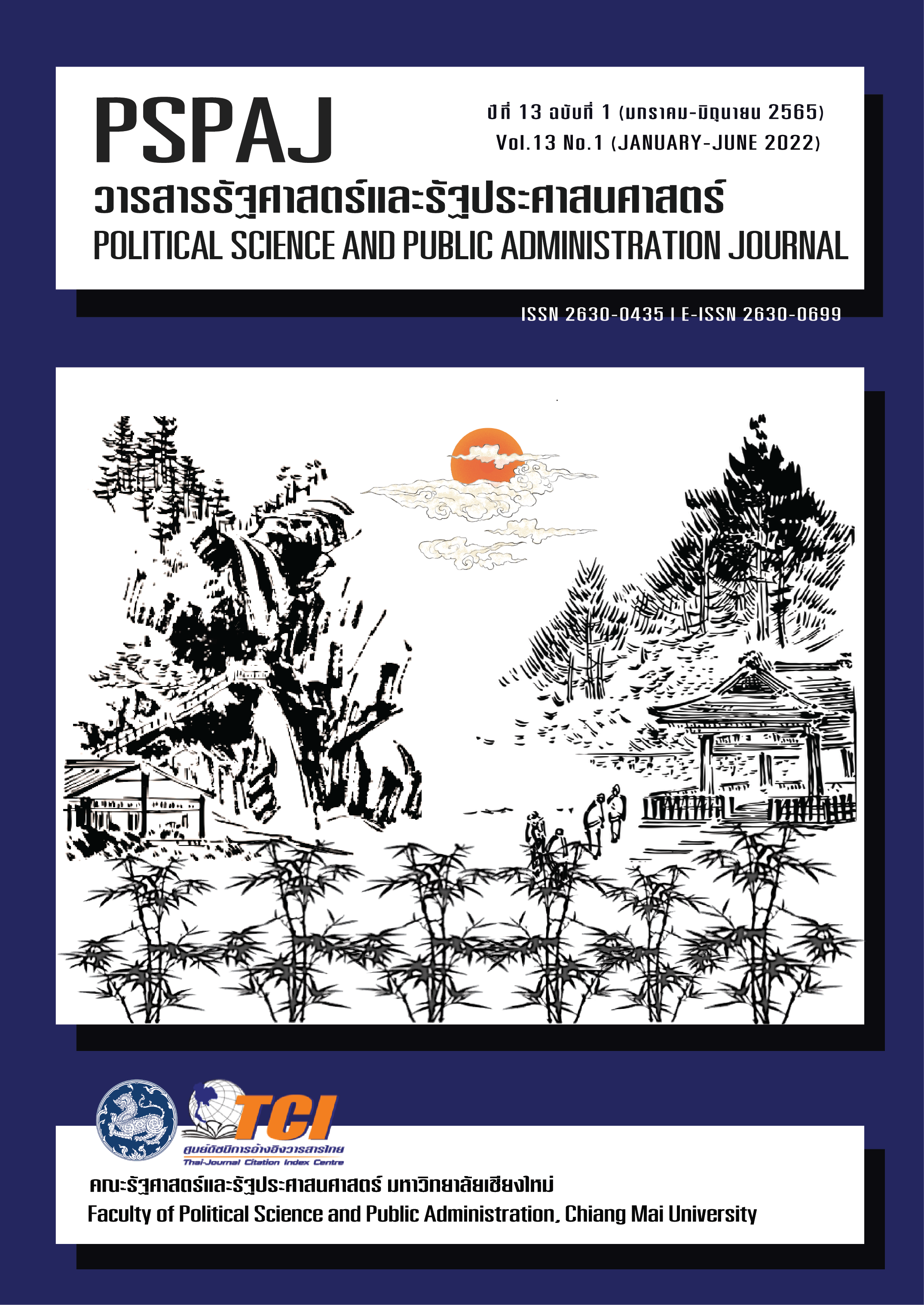Perceptions of Thais Toward Turkish Foreign Policies Through the Soft Power 30
Main Article Content
Abstract
This paper investigates the impacts of Turkish soft power towards Thailand from the perspective of Thai citizens. This study also examines the initial attitudes of Thais toward Turkey as a whole and builds a resource of data in order to promote Thailand-Turkey relations. It uses the qualitative method that relied on academic papers. In-depth interviews with 14 key informants were undertaken, online public opinion surveys also sought. The study finds that, after acquiring the data and evaluating it using the 6 indicators framework of the Soft Power 30, Turkey’s soft power has the most effective and identifiable impact on Thai citizens on cultural and historical dimensions. Global society engagement, education, economics, and technological factors all show a second-highest impact accordingly. In terms of the political and government dimensions, it appears that they have less impact on Thai society. It was also discovered that different religious groups had distinct sentiments regarding Turkey. Muslim in Thailand have more favorable sentiments of Turkey than any other religious group. This might be owing to the image that Turkey has cultivated in the international arena. The major impediment to the growth of Thailand-Turkey ties is a lack of mutual information. As a result, this research proposes that there should be an exchange of information and promoting mutual understanding between governments, private agencies, and educational institutions.
Downloads
Article Details

This work is licensed under a Creative Commons Attribution-NonCommercial-NoDerivatives 4.0 International License.
- เนื้อหาและข้อมูลที่ลงตีพิมพ์ในวารสารรัฐศาสตร์และรัฐประศาสนศาสตร์ถือเป็นข้อคิดเห็นและความรับผิดชอบของผู้เขียนบทความโดยตรง ซึ่งกองบรรณาธิการวารสารรัฐศาสตร์และรัฐประศาสนศาสตร์ ไม่จำเป็นต้องเห็นด้วย หรือร่วมรับผิดชอบใดๆ
- บทความและข้อมูล ที่ได้รับการตีพิมพ์ในวารสารรัฐศาสตร์และรัฐประศาสนศาสตร์ ถือเป็นลิขสิทธิ์ของวารสาร หากบุคคลหรือหน่วยงานใดต้องการนำข้อมูลไปใช้ประโยชน์ในทางวิชาการ ขอให้อ้างอิงแหล่งที่มาด้วย
References
กระทรวงการต่างประเทศ. (2554). สาธารณรัฐตุรกี. สืบค้นเมื่อ 14 ธันวาคม 2563, จาก www.mfackn.com/th/content/5d5bcc2115e39c306000a1be?cate=5d5bcb4e1
______. (2562). สถานเอกอัครราชทูต ณ กรุงอังการา จัดงานชุมนุมนักเรียนไทยในตุรกี ครั้งที่ 8. สืบค้นเมื่อ 14 ธันวาคม 2563, จาก https://www.mfa.go.th/th/content/5d5bd21215e39c3060027bca?cate=5d5bcb4e15e39c3060006843
ไกรฤกษ์ นานา. (2552). จากอดีตถึงปัจจุบันความสัมพันธ์ไทย-ตุรกี 50 ปี. กรุงเทพฯ: ประพันธ์สาส์น.
จิระโรจน์ มะหมัดกุล. (2560). การเปลี่ยนผ่านไปสู่การเป็น ‘อำนาจขนาดกลาง’ กรณีศึกษาประเทศอินโดนีเซีย ตุรกี และบราซิล (รายงานการวิจัย). ปทุมธานี: สถาบันคลังปัญญาและยุทธศาสตร์ชาติ มหาวิทยาลัยรังสิต.
ไทยรัฐออนไลน์. (2561). “อะเมซิ่งไทยแลนด์” ถึง “เติร์ก” เฉลิมฉลองครบรอบ 60 ปี “ไทย-ตุรกี”. สืบค้นเมื่อ 14 ธันวาคม 2563, จาก www.thairath.co.th/news/local/1392621
ยาสมิน ซัตตาร์. (2558). ตุรกีกับความช่วยเหลือเพื่อสันติภาพในพื้นที่ขัดแย้งสามจังหวัดชายแดนภาคใต้/ปาตานี. สืบค้นเมื่อ 14 ธันวาคม 2563, จาก https://deepsouthwatch.org/th/node/7404
วสมน สาณะเสน. (2563). Heritage of Ottoman Empire. สืบค้นเมื่อ 14 ธันวาคม, 2563 จาก https://readthecloud.co/ottoman-empire-coat-of-arms-tughra/
ศูนย์เทคโนโลยีสารสนเทศและการสื่อสาร สำนักงานปลัดกระทรวงพาณิชย์. (2563). การค้าระหว่างประเทศของไทยกับตุรกี. สืบค้นเมื่อ 16 ธันวาคม 2563, จาก http://tradereport.moc.go.th/Report/Default.aspx?Report=TradeThSummary
Çevik, S. B. (2019). Reassessing Turkey’s Soft Power: The Rules of Attraction. Alternatives, 44(1), 50-71.
Daim, T., Basoglu, N., Dursun, O., Saritas, O., & Gerdsri, P. (2009). A Comprehensive Review of Turkish Technology Foresight Project. Foresight, 11(1), 21-42.
Davutoğlu, A. (2008). Turkey’s Foreign Policy Vision: An Assessment of 2007. Retrieved December 13, 2020, from https://www.insightturkey.com/articles/turkeys-foreign-policy-vision-an-assessment-of-2007
Development Initiatives. (2020). Global Humanitarian Assistance Report 2020. Retrieved December 15, 2020, from https://devinit.org/resources/global-humanitarian-assistance-report-2020/#downloads
Freedom House. (2020). Freedom in the World 2020 – Turkey. Retrieved December 11, 2020, from https://freedomhouse.org/country/turkey/freedom-world/2020
Kadi, I, & Peacock, A. (2017). The Ottoman Empire and the Kingdom of Siam Through the Ages. Bangkok: Institute of Asian Studies, Chulalongkorn University
Kalin, I. (2012). Turkish Foreign Policy: Framework, Values, and Mechanisms. International Journal, 67(1), 7-21.
Koma, A. (2017). Ethical Dilemma Between Deontology and Utilitarianism: Turkey’s Policy towards Syrian Refugee Crisis in 2015. Asia Critique, 3(1), 151-174.
Mattern, J. B. (2005). Why Soft Power' Isn't So Soft: Representational Force and the Sociolinguistic Construction of Attraction in World Politics. Millennium, 33(3), 583-612.
McClory, J. (2019). The Soft Power 30. Retrieved December 11, 2020, from https://softpower30.com/wp-content/uploads/2019/10/The-Soft-Power-30-Report-2019-1.pdf
Nye, J. S. (1990). Soft Power. Foreign Policy, 80, 153-171.
______. (2004). Soft Power: The Means to Success in World Politics. New York: Public Affairs.
______. (2011). The Future of Power. New York: Public Affairs.
______. (2016). Bound to Lead: The Changing Nature of American Power. New York: Basic books.
Ozturk, A. E. (2021). Islam and Foreign Policy: Turkey’s Ambivalent Religious Soft Power in the Authoritarian Turn. Religions, 12(1), 38. Retrieved December 8, 2020, from https://doi.org/10.3390/rel12010038
Portland. (2019). The Soft Power 30. Retrieved December 11, 2020, from https://softpower30.com/
Republic of Turkey Ministry of Foreign Affairs. (n.d.). Relations Between Turkey and Thailand. Retrieved December 14, 2020, from http://www.mfa.gov.tr/relations-between-turkey-and-thailand.en.mfa
Sattar, Y. (2018). Güney Doğu Asya’nin Çatişma Bölgelerinde Türkiye’nin Varliği ve Etkisi. (Doctoral dissertation). Istanbul: Istanbul University.
Tol, G. & Baskan, B. (2018). From “Hard Power” to “Soft Power” and Back Again: Turkish Foreign Policy in the Middle East. Retrieved December 9, 2020, from https://www.mei.edu/publications/hard-power-soft-power-and-back-again-turkish-foreign-policy-middle-east
United Nations Development Programme. (2019). The Impact Investing Ecosystem in Turkey. Retrieved December 8, 2020, from https://www.undp.org/content/dam/istanbul/docs/The%20Impact%20Investing%20Ecosystem%20in%20Turkey_final.pdf
______. (2020). Turkey is in the Top Human Development Category for the Second Time in the Human Development Index. Retrieved December 11, 2020, from www.tr.undp.org/content/turkey/en/home/presscenter/articles/2020/12/hdr-2020.html
Wezeman, P. D., Kuimova, A. & Wezeman S.T. (2021). Trends in International Arms Transfers, 2020. Retrieved December 25, 2020, https://sipri.org/sites/default/files/2021-03/fs_2103_at_2020.pdf
World Bank. (2021). Turkey: Overview. Retrieved December 18, 2020, from https://www.worldbank.org/en/country/turkey/overview


